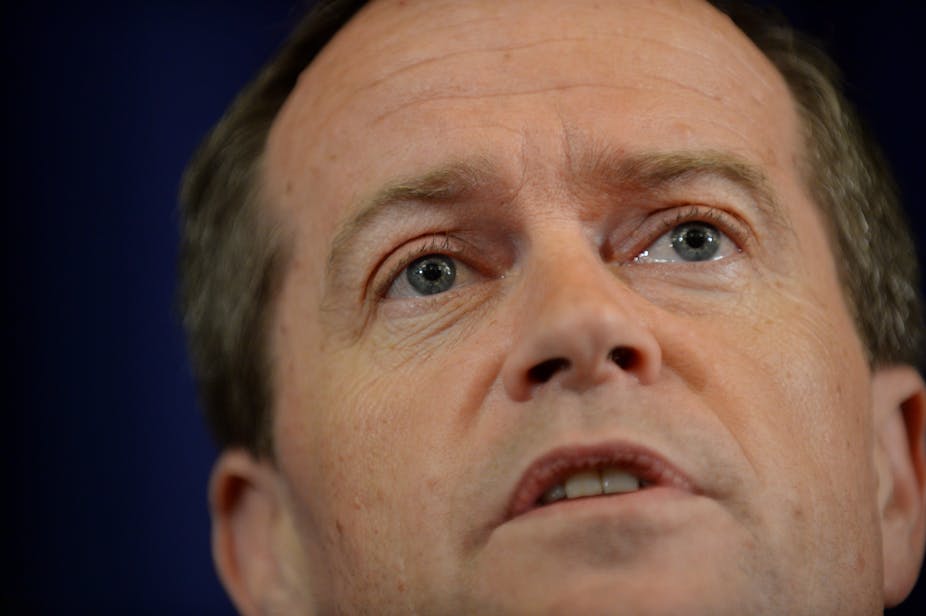In his pitch to Labor’s rank and file for the right to lead the federal parliamentary party, Bill Shorten declared that his aim - should he become prime minister - would be to serve on behalf of:
… the powerless, for the disempowered, for people who don’t have a voice in society.
Shorten returned to this theme in his first speech as party leader and reiterated his commitment to “develop(ing) the right policies, which are then explained with persistence”.
But how might such sentiments translate in a policy sense under Shorten’s leadership?
You would not be alone in wondering how Shorten actually intends to resurrect the Labor brand. Very little of policy substance was debated during the leadership contest between Shorten and Anthony Albanese, even though Shorten lauded the process for encouraging the party to “talk about ideas”.
The lack of specificity from both Albanese and Shorten is not all that surprising. How adventurous can we expect any leadership aspirant to be when every utterance is captured by reporters and potentially used against them at some later time? Perhaps Shorten won the contest not because of what he said he would do, but because he appeared to more “prime ministerial” in his manner of saying it.
Having said this, Shorten has provided some clues about those areas (as against policies) that he intends to emphasise as opposition leader.
Shorten has indicated that he will oppose the Abbott government’s plans to abolish the carbon tax. He has signalled his support for same-sex marriage, and even said that he would “actively consider” creating a shadow ministry for equality.
Shorten has vowed to be pro-immigration and more sympathetic to the plight of asylum seekers, including a willingness to revisit the issue of extending working rights to those found to be refugees “at the first pass”.
Shorten remains open minded about the new government’s paid paternity leave scheme. He has waxed lyrical in a wonderfully unspecific way about the virtues of internal party democracy and of the need to “modernise” the ALP’s relationship to the union movement.
There is, it seems, a little something for everyone in Shorten’s new Labor: from party members to disgruntled Labor voters, small business owners, farmers and professional women.
However, in order to make good on his promises, Shorten must find a way to conquer the electorate, the party and the government. All three present their own unique threats.
One of the biggest challenges for Shorten will be to traverse a policy course that satisfies both Labor’s traditional base, composed largely of working class voters, and its more affluent constituency.
Both segments of Labor’s base are often excited by many of the same policy issues but often for very different reasons. Take, for example, the issue of asylum seekers. Whereas the ALP’s traditional base is much more inclined to support a hardline stance on asylum seekers, its middle class supporters reject such a position.
There is no easy fix and both constituencies are important to Labor. While the party’s working class supporters are in the numerical ascendance, the middle class base dominates the trendy inner metropolitan seats held by Labor MPs.
In the context of the party caucus, Shorten is likely to find his colleagues fairly compliant: Anna Burke’s break with discipline is likely to be an isolated event. Part of the reason for this is because the recent federal election result has thoroughly subdued caucus. But another reason is that the party is now led by the same person who was at the centre of much of the intrigue that fatally wounded two Labor prime ministers. Shorten possesses the necessary guile to extinguish any serious ill-discipline before it can surface.
This is not to say that factional considerations won’t prove to be tricky for Shorten to manage. While caucus might be on its best behaviour, it doesn’t automatically follow that factional chiefs sitting outside of parliament won’t complicate matters. We got a taste of what this might mean when Joe de Bruyn, leader of the powerful Shop, Distributive & Allied Employees Association, intervened unilaterally to qualify Shorten’s position on the issue of parliamentary quotas and same-sex marriage.
Finally, there is the question of Shorten’s strategy in opposition. Shorten says that he will not replicate Abbott’s tactic of being “relentless negative”. While this is a virtuous position in principle, it may not be possible in practice. Shorten has not been gifted the situation of minority government that was served up to Abbott when the latter was opposition leader.
And while the incoming Senate crossbench is complex, it is unlikely to present a serious obstacle to the implementation of much the Abbott government’s agenda. In order to be relevant, Shorten may have to go out much harder against the government than he might otherwise wish.
The role of opposition leader can be a poisonous chalice. But Shorten is smooth, smart, articulate and wily. Importantly, he is different from both of his predecessors. Unlike Rudd, Shorten earned his political stripes in the cut and thrust of trade union politics. He truly comprehends the importance of keeping his friends close and his enemies even closer.
And unlike Gillard, he has the happy luck of being a man.

